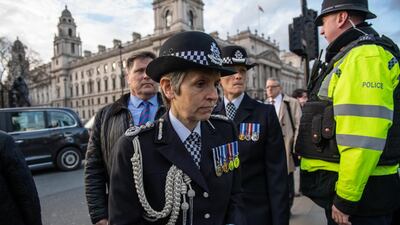London’s police chief has extolled the crime-fighting benefits stemming from the innovation of facial recognition as the jewel in the crown in the technological battle to stay ahead of increasingly sophisticated criminals.
London’s Metropolitan Police Commissioner Dame Cressida Dick said privacy concerns are “much smaller” than the need to protect the public from “a knife through the chest” and said criminals were increasingly making “powerful use” of the digital world to carry out their crimes.
Police deployed live facial recognition (LFR) in the British capital this month, despite warnings from experts questioning the effectiveness of the technology.
Dame Cressida said critics of the use of facial recognition technology should have to justify to victims of crime why police should not be allowed to use these methods.
“It is for critics to justify to the victims of those crimes why police should not use tech lawfully and proportionally to catch criminals who caused the victims real harm,” she told a conference at the UK’s Royal United Services Institute on Monday.
The first female head of the UK’s largest police force warned that the debate over the use of technology in policing was being dominated by critics.
“I and others have been making the case for the proportionate use of tech in policing, but right now the loudest voices in the debate seem to be the critics – sometimes highly inaccurate and or highly ill-informed,” she said.
The UK has one of the world’s largest mass surveillance networks. With around 420,000 closed circuit television cameras in London, the city is beaten only Beijing for the number of devices gathering video for security purposes, according to a 2017 report by the Brookings Institution.
While the British public is accustomed to a high level of surveillance in towns and cities, the deployment of LFR cameras has raised new concerns over privacy.
People scanned by the cameras are checked against a database of suspected criminals sought by police, and can be arrested by officers if there is a match. UK civil liberties group Big Brother Watch has called the use of the technology to fight crime “dangerously authoritarian,” and in January its director, Silkie Carlo, said the UK was “heading down that road to a surveillance state”.
“Never before have citizens been subjected to identity checks without suspicion, let alone on a mass scale,” Ms Carlo said during an LFR deployment in the centre of London last week.
Dame Cressida further defended the use of technology to support policing in the UK, saying that “the only people who benefit from us not using … tech are the criminals, the rapists, the terrorists and all those who want to harm you, your family and your friends”.
The police chief called for broader adoption of new technologies in the UK’s police forces, arguing artificial intelligence could help identify potential terrorists: “If, as seems likely, algorithms can assist in identifying patterns of behaviour by those under authorised surveillance, that would otherwise have been missed, patterns that indicate they are radicalising others or are likely to mount a terrorist attack … then I think almost all citizens would want us to use it.”
Dame Cressida said she welcomed the government's 2019 manifesto pledge to create a legal framework for the police use of new technologies like AI, biometrics and DNA.
"The best way to ensure that the police use new and emerging tech in a way that has the country's support is for the government to bring in an enabling legislative framework that is debated through Parliament, consulted on in public and which will outline the boundaries for how the police should or should not use tech," Dame Cressida said.
"Give us the law and we'll work within it," she added.


